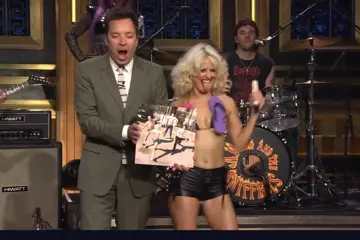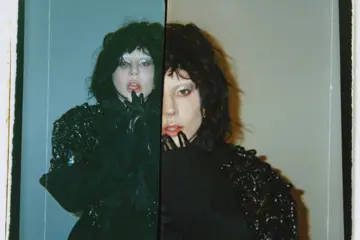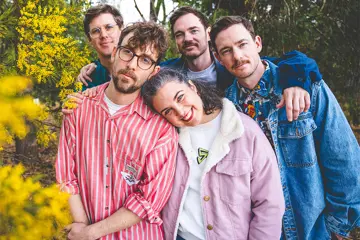For a humbly recorded pop album, Wilding's debut Bird's Bread has a wider and weirder range of instruments than most bands ever muster. There's kazoo, toy piano, melodica, spoons, pots and pans, shaken water bottle and even a cheese grater. That's in addition to a bashed acoustic bass salvaged from a roadside and stringed instruments from all over the world brought in by a friend.
“That makes it sound like some crazy, avant-garde experimental album,” laughs Wilding founder Justin Stokes. “But at the end of the day it's just pop music.”
As a one-man band, Stokes credits producer Robin Waters with getting all those surprising little sounds just right. Still, Bird's Bread was the first album Waters produced; he's better known for playing in The Boat People and Machine Translations. Waters recorded it at his house over quite a while, fitting it in between other musical obligations. He and Stokes knew each other from when they both lived in Brisbane; they got reacquainted when Stokes played some songs on acoustic guitar at a Carlton North laneway party. Waters offered his production hand, and the results can be heard in joyous colours on Bird's Bread.
Summing up the offbeat record, I'll Love You Until Monday Morning is an improbable choice for the lead single, even if the radio edit shaves off a third of the nearly six-minute running time. It's lackadaisical and cites “gene mutations” amid other subject matter, while its airy bridge is more eccentric still. It's very '60s-saturated, as is the whole record, though some of these catchy quirks also evoke the kaleidoscopic greatness of Super Furry Animals on a smaller scale.
Stokes admits his fondness for the heady decade that birthed psychedelic pop, but he says he doesn't sit around listening to only '60s music. “It's not like that,” claims the native Englishman, who picked the moniker Wilding in honour of the middle name shared by Stokes, his father and grandfather. A name, according to family history, originally taken from an Irish racehorse. “I like strong melodies and songcraft,” he continues. “I do like pop music. I'm originally from Liverpool, so we grew up with The Beatles. Melody's in our blood. You can't avoid it.”
On that note, Up On Lavender Hill might seem like a nod to the Kinks song Lavender Hill – or at least inspired by the same South London landmark – but actually Stokes simply liked the word “lavender.” Ditto Pale Blue Eyes: it's not a Velvet Underground cover or homage, but just a song about his girlfriend. Even the Kinksy lyrical panache of She's A Casual User is offset by lazy-afternoon country tinges. “It might be more Muswell Hillbillies-era Kinks, or early-'70s Kinks,” offers Stokes, confirming one of his favourite bands in the process.
As for his own bands before the solo venture Wilding, he played in Brisbane's The Whistlestops when his family first moved here from England and then in the Isle Of Man when he relocated to Melbourne five years ago. “I just found that I wasn't able to do everything I wanted to do [as] a singer and songwriter,” he recounts. “Wilding is great because we had the freedom to make this record of lots of different layers and melodies and ideas, and lots of different instrumentation. And we didn't have to once go into a rehearsal room and deal with a band.”
Yet there's a band made up of friends for when Wilding performs live, as at the upcoming album launch plus a Melbourne showcase for Wilding's Sydney-based label Laughing Outlaw. It's by no means a rigid re-enactment of all the album's splashy layers, says Stokes, but just something to be enjoyed in its own right. That said, “I'm looking forward to getting back into recording again as soon as possible,” he adds. “That's where I feel that what I do can be best expressed.”















